Pine Mountain Settlement School
Series 09: Biography – Staff/Personnel
Series 07: Directors
Evelyn K. Wells, Secretary 1916 – 1931; Acting Director 1931
EVELYN K. WELLS 1919 EXCERPTS FROM LETTERS HOME
TAGS: Evelyn K. Wells 1919 Excerpts from Letters Home : Evelyn K. Wells ; Pine Mountain Settlement School ; transcriptions ; letters ; Marguerite Butler ; Board of Trustees ; PMSS early history ; Edith Scott ; Almon Huff ; Landis Hall ; Elbert Walker ; Birchel Callahan ; Burkham School House fire ; Miss Parkinson ; Katherine Pettit ; Ethel de Long Zande ; Luigi Zande ; Elizabeth Hench ; Miss Schubert ; funerals ; William Creech, Sr. ; Aunt Sal Creech ; Columbus Creech ; Emily Hill ; Elizabeth Hench ; Aunt Marthy ; Aunt Sary ; Kenneth Nolan ; Raymond ; Helen Wilbur Stone ; James Madison ; Uncle John Fiddler ; Andy Dorsky
1919 January 13
One can now. get a hot tub at Pine Mountain. Laurel House is most hospitable to us all. I usually stop work an hour before dinner, bathe in luxury, and eat dinner like a lady. No more heating of water in an Iron kettle outdoors. We killed six hogs on Thursday, and today there are spare ribs for dinner.
The newest development in the mail situation is that the School going to buy another pair of mules and carry it at $7.00 a day. Even that won’t pay us, as we have to buy the mules, but of course we’ve got to have the mail. No mail now for three days.
1919 January 24, 1919 [School House burns]
From: PMSS
Evelyn Wells to Angela Melville
January 24, 1919
Dear Angela:
Not a sheet of paper or inch of space to be wasted, I must tell you that the schoolhouse burned down at two-thirty this morning. The boys and Miss Parkinson jumped for their lives, literally, and are burned, broken, sprained, — how much more hurt, we can’t tell, though the doctor comes in today. Mat and I got the safe, the M.L. and a handful of supplies out, — Mat with not a stitch but a blanket on, I in a nightgown and rubber boots.
Miss Scott [Edith Scott], Birchell [Harris], Almon [Almon Huff], Landis Hall, (May’s cousin [May Ritchie]) and Elbert Walker did not get out. It a marvel that anyone did. In an hour the building was completely gutted.
As you see, the typewriter is out. The children were splendid, quiet and helpful. Nobody lost their head. It has been terrible for Mrs. Z. [Ethel de Long Zande] who watched it all from the Far House, but she resting now, and a little later I am going up to talk about things with her.
I am established in the alcove of the canning kitchen, — a safe, two typewriters, my 1918 files, and a drawer-full of supplies. The irony of filing this morning! Can you see Andy [Dorsky] on the job, moving the books, etc., Kenneth Nolan most helpful, and a knot of sympathetic men just jumping to help at any suggestion? All this after breakfast. You would be proud of the scratches on the safe now; they mean the security of the school and the integrity of the lists [donor lists]. We can go on! The top almost came off and it’s badly blackened. I spent nearly hour wiping its poor face with coal oil, thankful for the blessed activity.
We are so thankful that Miss [Katherine] Pettit was away, and that it was a warm night. and windless. Either Laurel [House] or Far H. [House] would surely have gone had there been any wind. As I you wrote you last night, Mrs. Z. [Ethel de Long Zande] had written for Miss Schubert [Leah Schubert] to come and close the books. We shall be lost if she doesn’t come.
We are getting out a board letter today and I imagine the news sheet will come directly. All the correspondence was up to date. This is remarkable, considering I had been running the other office too. Miss Hench’s [Elizabeth Hench] book about the literature (all gone, of course) was out of the safe for the time being, also five insurance policies. Of course we shall begin to miss things all the time, but it’s remarkable what was saved. Miss Pettit has lost her school records for the third time. Mrs. Zande[‘s] valuable books from her office.
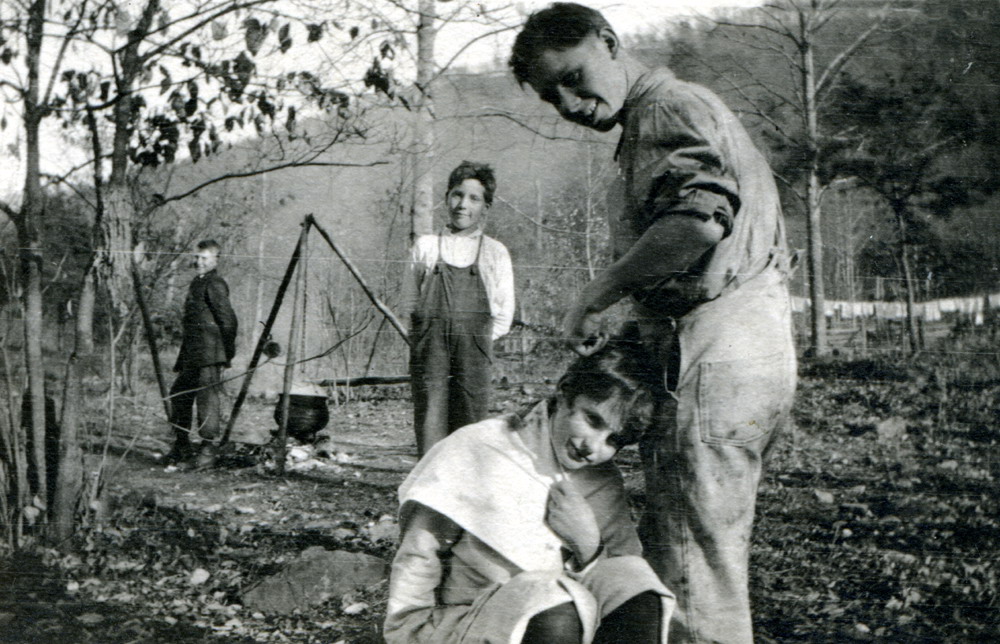
Frances Lavender Album. Latest in barber shops. John D. Callahan is the barber & Birchell Harris being shorn. Vernon (Vernin) & Will Helton are the audience. [lave035.jpg]
But of course the dreadful thing in all our minds is those poor boys and Miss Scott. Almon [Huff] was last seen in a corner on his knees, praying, and he said he was going back for Miss Scott. We are cherishing that lovely thing about Almon, who has given so much trouble lately. Willie Stone [Helen Wilmer Stone] is broken up over him, of course. The little boys, Landis and Elbert, we don’t know anything about; we trust and pray that they smothered at once. Irving heard Miss Scott call to him from the window. She couldn’t have suffered more than a minute. She had a sister in Philadelphia, but we haven’t her address, and have to communicate with her through a friend In New York. Columbus has taken Emily home to tell them about Elbert and Landis and Raymond’s safety. Poor Emily, — she was great, and was with Mrs. Zande while the building burned, and I’m glad Mrs. Z[ande]. had her to comfort. Mr. Zande [Luigi Zande] walks around like a ghost and eats nothing but drinks coffee. He was everywhere at once this morning, and so clear-headed, — about leaving Irving instructions about what to do in Harlan, sending telegrams, seeing Mr. Callahan and Mr. Huff and buying clothing for the boys.
Think of storeroom, with all the surplus clothes and shoes for the children. But we can go on, thank Heaven.
Hoards of visitors from down the creek early this morning.
Far H. [House] lower floor is turned into a hospital ward; Pole H. [House] is being fixed up for the older girls, and the ten boys are being crowded into every nook and cranny. Now to Mrs. Zande. I’ll write when I can, but you’ll understand if you don’t hear. Please send this to Dorothea (Mrs. P.H. Holt, … Oakridge Ave., Summit.) I’m writing her briefly that she will get the details from you.
Yours (EV)
February 1919 ( after the Schoolhouse burned, Jan. 24, 1919)
The boys are all established at Far House again (they’d been housed in the Schoolhouse.) It seems strangely natural, for they are the ones that used to live here. Parent’s have flocked In, all so nice. Only one has taken his chiIdren home; the others just came to reassure themselves and It did a world of good to the children. Two fathers appeared with new step-mothers, one of them Lillie’s. She was disgusted, but perfectly dignified, however, not at all effusive.
The coroner’s inquest held yesterday in the Far House Living room. I took the evidence on the typewriter. Five verdicts were found, one for each lost life; cause of fire unknown. The incompetent men from Harlan in charge. Strangely little to do in such cases. — Yesterday Almon Huff and Miss Scott [Edith Scott] were buried up on the ridge where Uncle William lies. There had to be immediate burial. If Miss Scott’s sister wants other disposal it can of course be made. But what has been done now seems quite adequate in such a situation. (N.B. Scott the book-keeper. Almon went back into the building to try to rescue her.) The boys have been wonderful. I’ve given James Madison my toolbox as a reward of merit for helping to get things out of the Office. He’s a very good carpenter, and as every tool on the place went, it’s an asset for him and a help to the school.
Columbus Creech is getting timber out of the woods as fast as he can. Plans for the Office, the first building to go up, are made, and the site chosen and staked off, and Andy Dorsky is cutting stone for it.
There is to be one absolutely fireproof room, with even steel window frames, and the whole building to be of stone. The Insurance man has come: cause of the fire remains unknown. We couldn’t rebuild the schoolhouse as it was for less than $18,000. It cost $12,000.
Boxes are still pouring in. And, about $2500 has come in contributions, absolutely unsolicited. School goes on calmly, though every day we miss something else. The oldest ones go all morning, 7-11:45; they then work all afternoon. Intermediate group work in the morning and go to school 1-5 p.m. Classes meet in the ironing room and various corners of Laurel House. The primary children have school at the Farmhouse and the kindergarten at Far House.
Easter Sunday
The usual carols early this morning, the usual egg-hunt after breakfast, and a very unusual play — scenes from the life of Christ, very simple and affecting. The big boys were the Disciples, so serious and dignified in the scenes of the Last Supper and the Resurrection. All interspersed with good Easter hymns. This afternoon the children have all gone to an open meeting of the Good Citizens’ Club They have a great time reading the newspaper, which has been written in class during the week.
The Old Fashioned Dinner. March 14, 1919
SEE: FOODWAYS: OLD FASHIONED DINNER, MARCH 14, 1919 for the FULL TEXT.
[One of the most entertaining stories about story-telling and cooking an old-fashioned dinner with members of the community in 1919.]
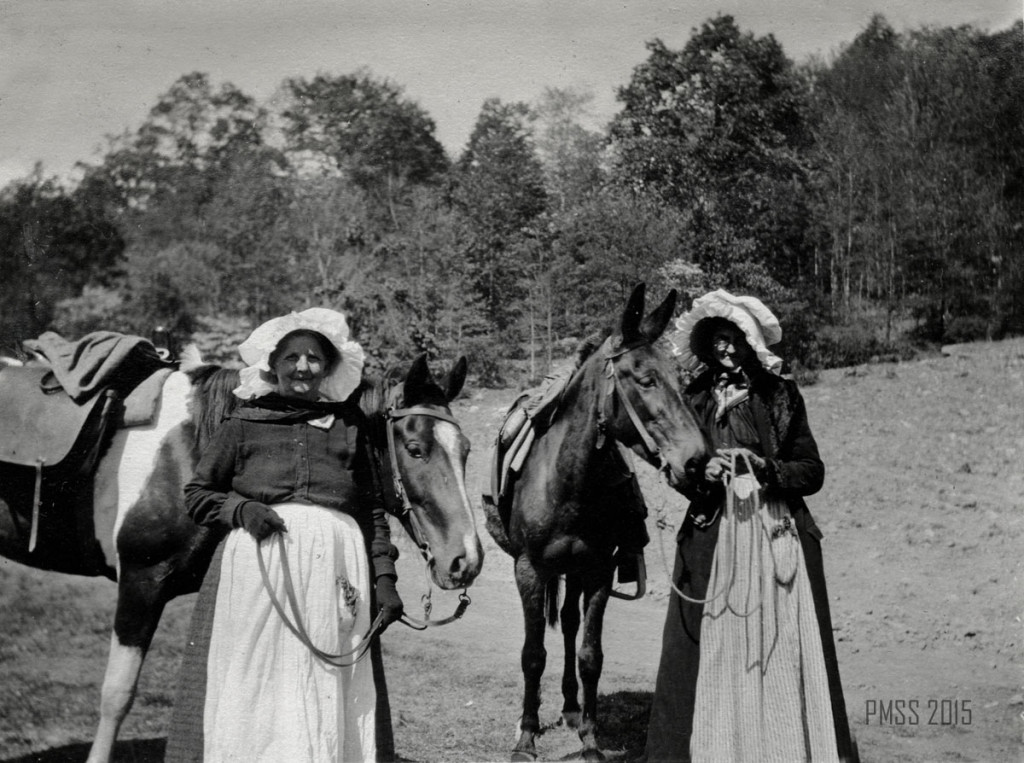
0051a P. Roettinger Album. “Aunt Judy and Aunt Stacey Ellen arrive.” [Two women: One at left standing next to a horse, one at right standing next to a mule. Note sun-bonnets.]
The Old-Fashioned Dinner, March 14, specially for old ladies of the neighborhood who came and “ate dinner” with us at the Old Log House…
May 30
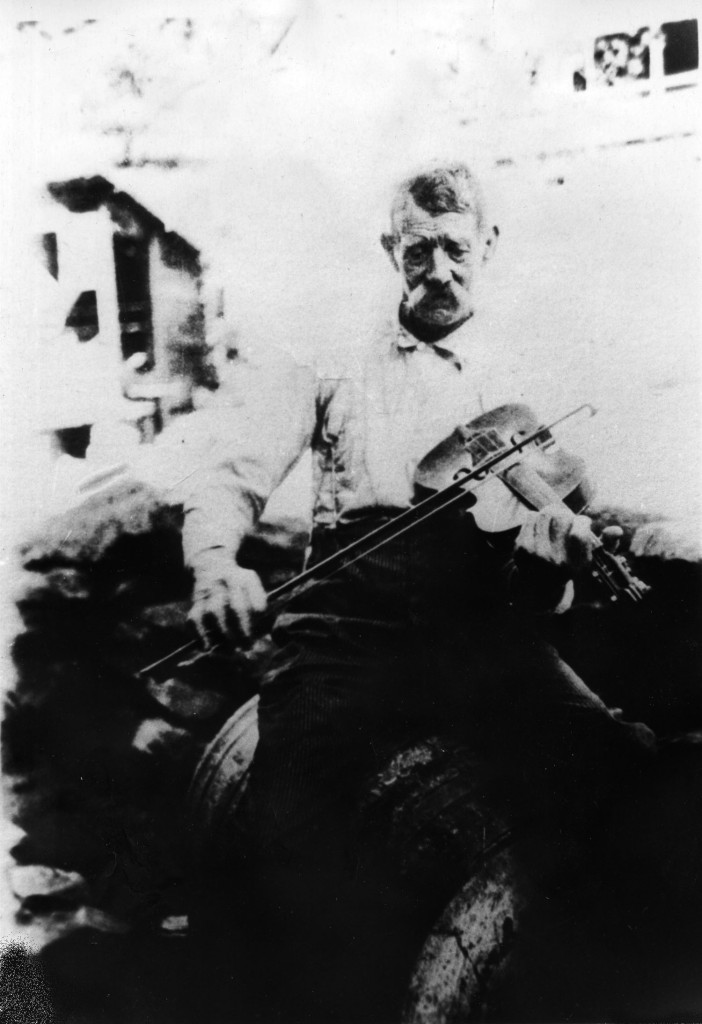
Fiddler John. Selected Exhibit
Here is Uncle John Fiddler‘s latest about his new fiddle. “She’s a beauty, I tell ye. I want ye to get her a case to shade her fro the air. I allus was a musical-minded man, an’ if I can jest set down with my fiddle, hit drives all the mean things away. When aggravations gether round about me, I play a tune, an’ if I can jest set down with my fiddle hit drives all the mean things away. When aggravations gether round about me, I play a tune, an’ that leads to another, an’ pretty soon all the aggravation’ things is plumb driv’ away. Likewise, if I’m mad, or troubled about the financial matters of the world.”
July 29
Sunday morning the convicts (men working on the little lumber railroad) came to visit us, twenty strong, with two guards. What a circus! Some of them were Negroes, with guitars, who gave us a real vaudeville show. We sent hasty word to the kitchen, and Miss Gaines rose to the occasion and made us two extra platters of chicken and dumpling, by squeezing a bit here and there. The men made a tour of the grounds, and performed again for us, while we all “throwed” in (passed the hat), and then left,. We were glad of the contrast in the afternoon, when after “meeting” eight of the children were baptized, and the solemnity of this occasion detracted somewhat from the glamour of how nice it is to be a convict.
The older Sunday School class celebrated “Decision Sunday” by joining the King’s Sons and Daughters, and afterwards, if they wished, being baptized into the Church Universal. We kept comparing it to a baptizing down the creek, and were very glad that the minister from Harlan was so dignified and lacking in hysterical appeal. It is a shame that complete immersion is so undignified, after it is over!
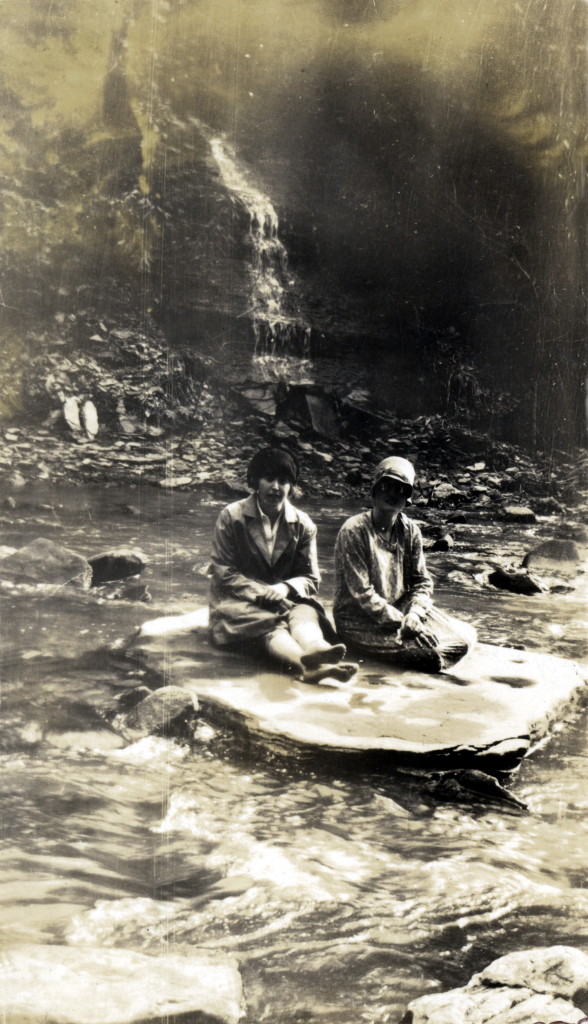
Astrid Anderson, bookkeeper at PMSS with friend at Gabes [Branch] Falls, 1929. [X_100_workers_2555_mod.jpg]
Yesterday, a trip of sixteen miles around Gabes Branch. Only two houses in six miles, and virgin timber everywhere. And, after our picnic lunch and a nap I bathed in the pool. Then back to Main Greasy, houses more frequent, and Dr. [Grace] Huse busy with anemic women and sick babies and children broken out with risings and sore eyes. At Big Laurel [Medical Settlement] we saw the logs piled up ready for the Doctor’s House, and the ground staked off.
Two workers from Henry Street Settlement descended upon us recently, with packs on their backs. They had been walking for a week through the neighborhood, but we showed them things on this side of the mountain that they didn’t know existed They were particularly tactful and intelligent about everything, especially interested in nursing problems.
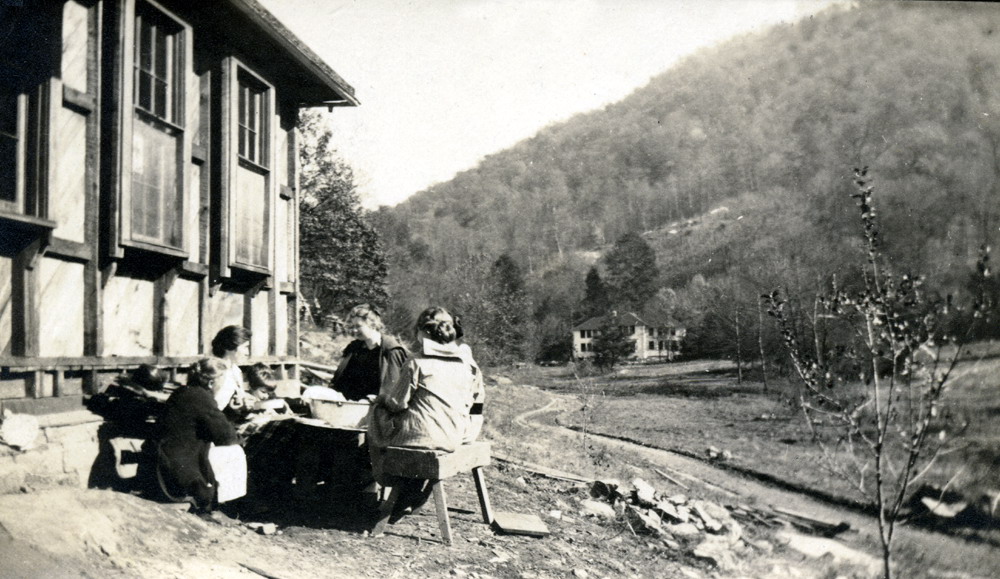
Office. Under construction with K. Pettit, Evelyn K. Wells and others. Laurel House in distance. c. 1918. [II_5_old_log_office_221b.jpg]
The Office is nearly ready to move into. Doors and windows hung, staining all done, etc. But, we may have to use it for school for a while, so we won’t move in till that is over. This week, too, the dentist comes for two weeks’ work on the children and the neighbors, and his clinic will be held at the Office, Then we’ll move in!
August 3
We are rounding up road [Laden Trail – The Road] subscriptions in Harlan which means thirty form letters for me today, and beginning to make appointments for Angela Melville, who will make a trip for the School this fall, and sending out special appeals for the Medical Settlement [at Big Laurel]. Next week there will be a log-raising for the house for doctor and nurse at Big Laurel.
August 10
The two dentists have been busy every minute, Dr. Grant examining, and then turning patients over to his assistant for treatment. Lots of people. And oh, the awful mouths! One woman had eighteen teeth pulled out at one sitting, and Uncle John Fiddler, twelve. And no novocaine. The doctors said the children’s teeth were better than those of city children. Dr. Grant is tremendously interested, and will come every year, he says. Then there were prophylactic talks in the dining room and classes in tooth-brushing for all the children, lined up on the terrace with their tooth brushes and mugs. Two country schools came. It’s perhaps as well that no more than two came, for these can be an object lesson for the community, as toothaches arise.
September 14, 1919
The other night we were all startled about 9:30 by the sound of galloping hoofs and calls from two men on horseback. We heard the next day that they were from the other end of the mountain, riding to Harlan Town, who had lost their way. It is usually so absolutely quiet here at night, that such an occurrence is talked and talked about.
The dogtrot of Old Log these days is filled with looms, and one finds Dosia (Docia) in one corner working on a gay pink and brown striped blanket, Arlena in another weaving one dyed with spruce pine, pale brown, and Ralph, aged twelve, at the big clumsy Colonial loom, barely able to touch the treadles, and just absorbed in the cotton counterpane he is making.
October 1919
This morning, after two hours in the office, (Sunday) I went to Chapel, and then we sang ballads for the visiting Board members (Mr. [Charles N. Manning and Mr. Atkins), and the children gave a beautiful Robin Hood play. They had such a good time, and their Lincoln green was so gay against the woodsy background. King Richard (Columbus Cornett) a handsome boy who walks twelve miles to and from school every day.
November 13, 1919
On Tuesday we all did our civic duty and voted for the reform candidate for magistrate — an important office around here where whiskey and roads are vital and recurring questions. Squire Browning has had the office sixteen years and the liquor interests were all for him. We heard that they were counting on our voting late in the day and were planning not to have any ballots left for us, so we all went right after breakfast. Such difficulties as the clerk of the polls had without names and addresses! “You live at Pine Mountain — Is that m – t – s or m – t?”
Things were quiet till the middle of the day, and then we heard that George Holbrook, the sheriff, had taken away pistols right and left till all his pockets bulged and he had three under his arm. No wonder that when the children heard about the Disarmament Conference they thought it was the delegates whose pistols were going to be taken away from them. “Little” Henry Creech (so-called to distinguish him from Uncle William’s son Henry) got the magistrate’s office by a majority of forty votes a sweeping majority here. So this country is looking up. Such an array of moonshiners as there was at the polls, voting for the other man. “Our” Henry Creech had been up and at the polls at 2:30 a.m to see that everything went right.
One dramatic incident was the arrival of old Aunt Louize [wife of Fiddler John] to vote. She’s lived all these years within a mile of the school, and never been able to come to see us, being very rheumatic. Her grandson, Pearl Shell, was too young to vote but he said he’d get someone there in his place, and he did! He harnessed the mules to the wagon, and got chairs for her and Uncle John Fiddler to sit in, and they drove in state around the grounds and so to the Polls. Uncle John Fiddler has been “hot as Hell” for young Henry [the candidate].
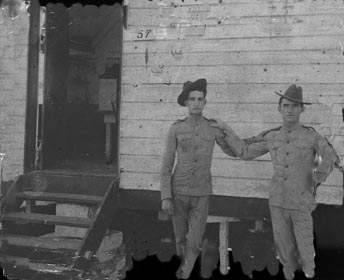
William Hayes Sr. and friend, WWI. [Will1-copy.jpg]
On Armistice Day, Mrs. Zande gave an excellent talk in the morning, and we had two minutes of silent prayer in the dining room at twelve — not a rustle from even the smallest child. Then we sang “For all thy saints, [Oh Lord] “
[For all thy saints, 0 Lord,
our grateful hymn receive,
who followed thee. obeyed, adored,
and strove in thee to live.
For all thy saints, 0 Lord,
accept our thankful cry,
who counted thee their great reward,
who strove in thee to die.
…etc.. (Richard Mant, 1837; Music: Franconia, St. George, Camberwell, Mount Ephraim (St. Helena), Bowden,)]
November 16, 1919
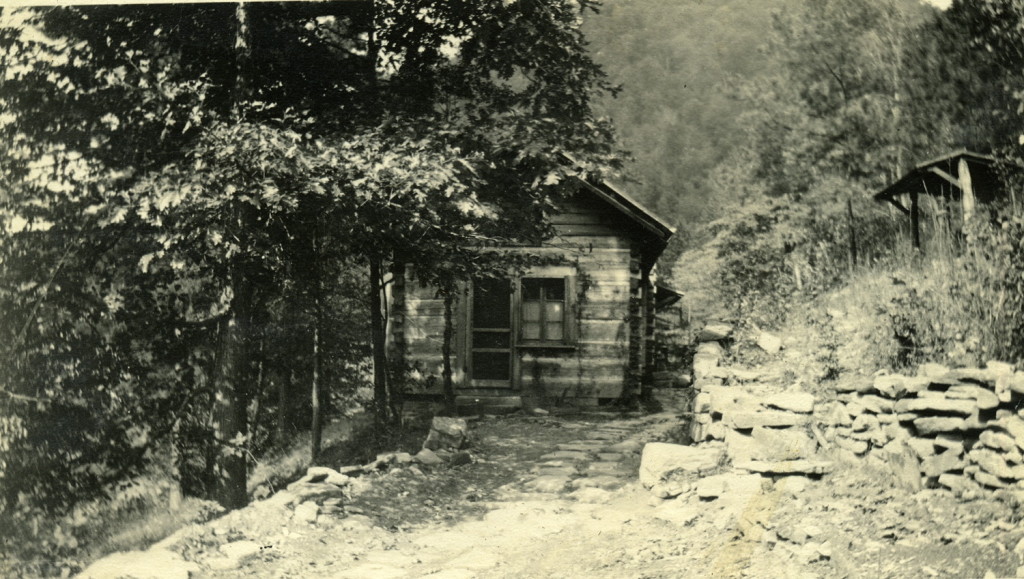
Medical Settlement, Big Laurel. Doctor’s House and Well House on hill to rt. [nesb_054_mod.jpg]
Everyone has gone to Big Laurel, where Preacher Lyttle [Lewis Lyttle] is making the dedicatory sermon for the Medical Settlement [Big Laurel]. An interesting occasion and I regret that I simply couldn’t make it …
Our Office housewarming is about to take place. The little entrance hall, which is on two levels with a wide step between and leaves and strings of red peppers, lovely color against the oak paneled walls. Doors and windows looking out on the valley, sunlight and firelight at the same time.
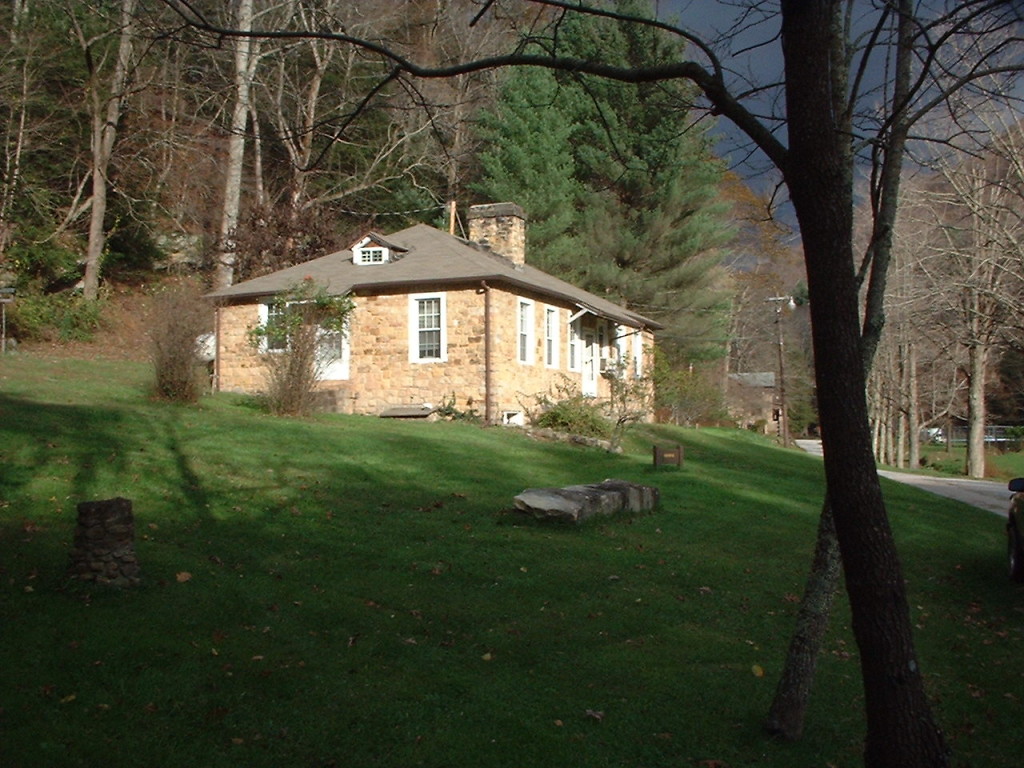
Office. View in late afternoon, 2015. Photo: H. Wykle. [DSCF0006.jpg]
See Also:
EVELYN K. WELLS Biography
EVELYN K. WELLS GUIDE TO ADMINISTRATIVE CORRESPONDENCE
EVELYN K. WELLS RECORD OF PINE MOUNTAIN SETTLEMENT SCHOOL 1913-1928 [INDEX] (Early in-depth history of Pine Mountain Settlement School)
EVELYN K. WELLS, GUIDE EXCERPTS FROM LETTERS HOME
EVELYN K. WELLS 1915 EXCERPTS
EVELYN K. WELLS 1915 EXCERPTS Horseback to Hindman
EVELYN K. WELLS 1916 EXCERPTS
EVELYN K. WELLS 1917 EXCERPTS
EVELYN K. WELLS 1918 EXCERPTS
EVELYN K. WELLS 1919 EXCERPTS
EVELYN K. WELLS PUBLICATIONS
The Ballad Tree: A Study of British and American Ballads, Their Folklore, Verse and Music, Together with Sixty Traditional Ballads and Their Tunes. New York: Ronald Press, 1950. Print.
EVELYN K. WELLS, “A Little True Blue American, 1920”
EVELYN K. WELLS TALKS
EVELYN K. WELLS, TALK Harvard University, July 1, 1955

